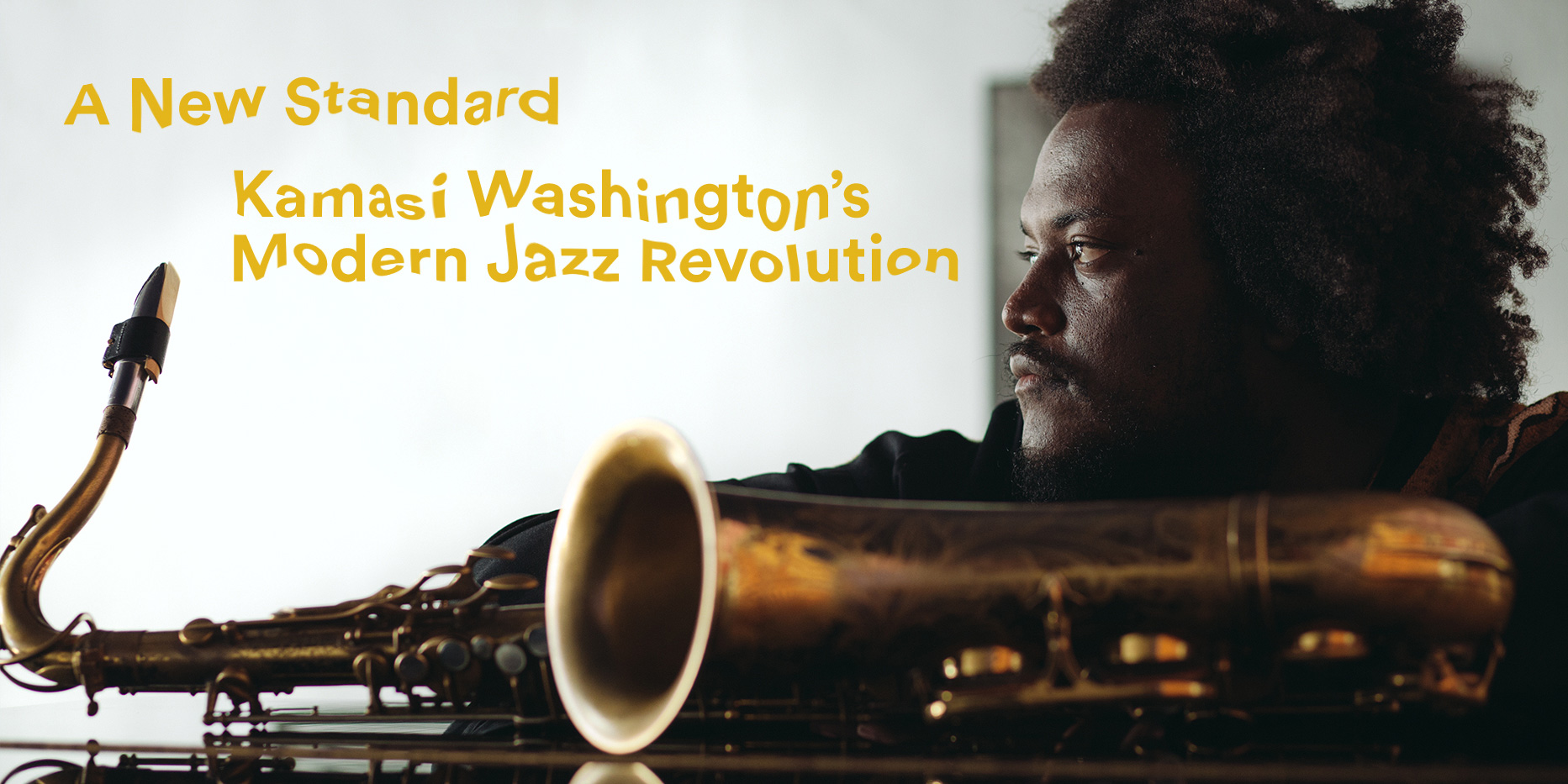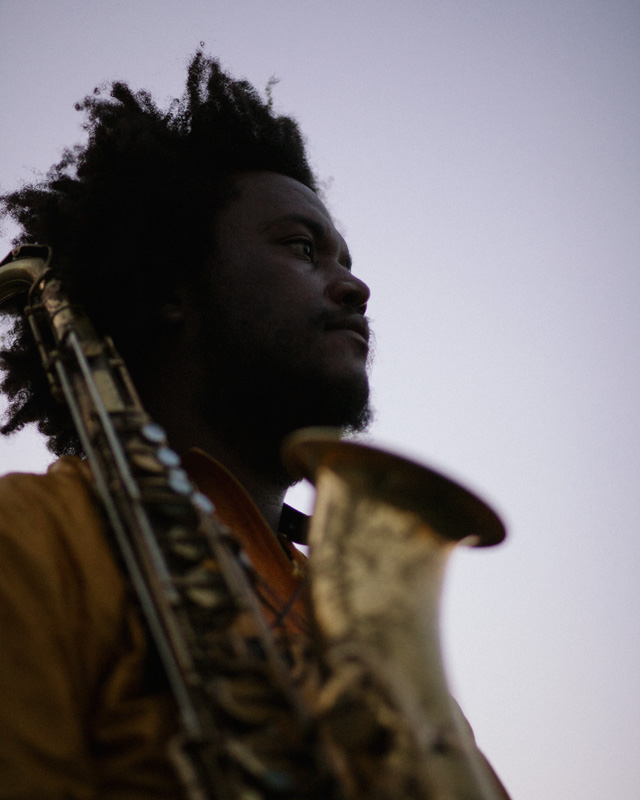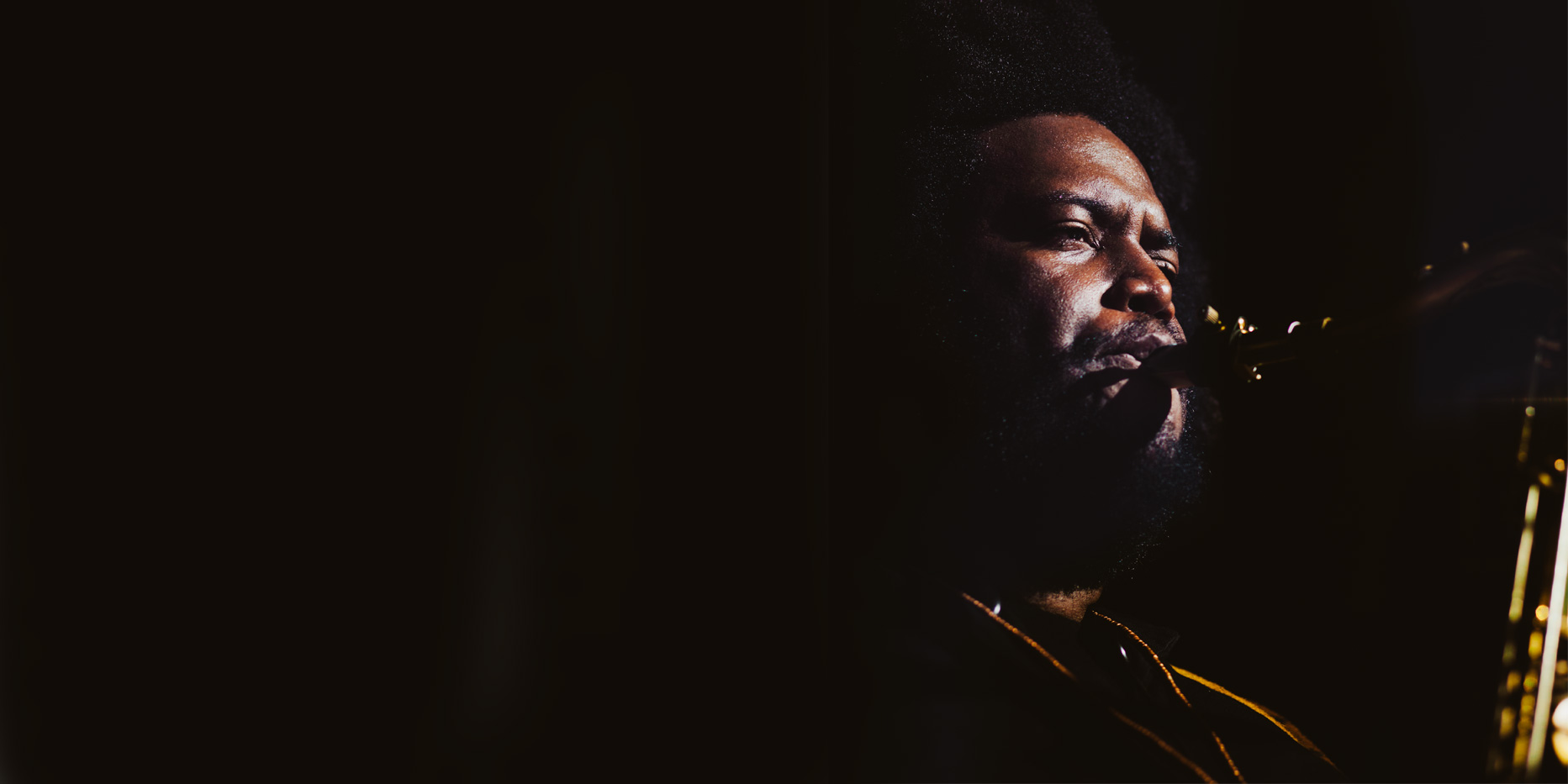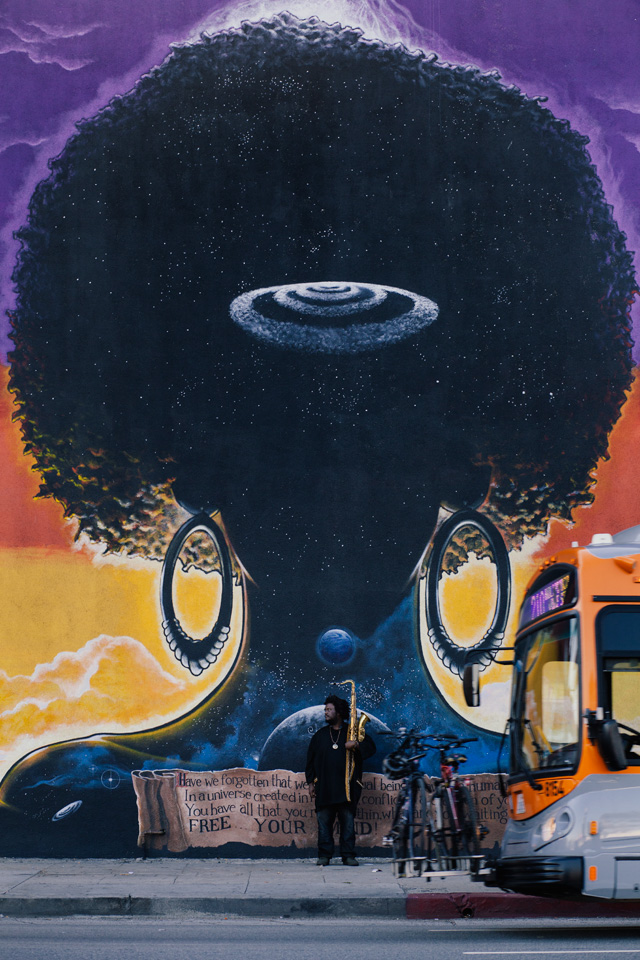He was apart of the production team for Kendrick's 2nd Album:
https://itunes.apple.com/us/album/the-epic/id975772107

Interviews: A New Standard: Kamasi Washington’s Modern Jazz Revolution
BY Ian Cohen
JUNE 9, 2015PHOTO BY: MIKE PARK
Kamasi Washington: "Miss Understanding" (via SoundCloud)
Kamasi Washington is a common link between two of this year’s most necessary records, and there’s a good chance you’ve heard one of them. The L.A. musician arranged strings and played saxophone on Kendrick Lamar’s To Pimp a Butterfly, which has sold around 600,000 copies in three months—not bad for a 79-minute opus that blends hot jazz, atomic funk, spoken word, West Coast hip-hop, militant politics, and Afrocentric positivity. But the otherrecord might have pulled off an even more impressive feat.
Washington’s de facto debut, The Epic, has achieved consensus acclaim from the notoriously New York-centric jazz community while also crossing over to some non-jazz listeners, despite having no EDM fusions, no guest rappers, and nothing that would pacify a quaint cocktail hour. Granted, the 34-year-old’s association with Lamar and Flying Lotus’ Brainfeeder label has helped him become a topic of interest outside of his genre, but there’s no getting around the fact that The Epic is filled with three hours of music very much steeped in the jazz canon. Washington’s excitement over his new ambassadorship is especially crucial right now, when jazz has been deemedthe least popular genre of American music.
“I’ve had experiences where people say, ‘I hated jazz before I heard you guys!’” Washington notes. “I’m like, ‘You didn’t hate jazz before you heard us, you hated the idea of jazz.’” In particular, the musician points to his gigs at Hollywood goth club Bar Sinister, where he would soundtrack fanged patrons “getting strapped in and beat with whips—and they would go nuts for us.”
Stream the album:
It’s a Friday afternoon in May when I meet with Washington at his Inglewood home. His wardrobe is decidedly mystic: turquoise dashiki, knitted hat, and a medallion with the circumference of a Coke can. Walking through his backyard, we’re greeted by his two dogs, Mecca and Mi’raj, named after the birthplace of Muhammad and a spiritual journey outlined in the Quran. Now, I’d hate to describe the personal conservatory of a modern jazz visionary as a “man cave”... but that’s more or less the vibe. The converted shed houses a barely organized array of drums, computers, a light recording rig, Rhodes keyboards—basically everything but his main instrument, the tenor sax. It’s also filled with books including A Marriage Manual—A Practical Guide to Sex and Marriage and the weight-loss handbook Thin for Life, though Washington is currently single and proudly stout, sturdily built but not gigantic, similar to an offensive lineman from a Division III school.
When he gets into the narrative guiding The Epic, things can get a little out-of-hand (once again, it is a three-hour record). Its penultimate track reworks Ossie Davis’ eulogy for Malcolm X into a melody, and there are a few vocal numbers that outline an impressionistic story detailing a warrior’s struggle to find himself, but The Epic is a rare political album that’s mostly instrumental. Just on the basis of its resolute existence, Washington feels the record is part of a societal push back to what he repeatedly calls “the dimming of the mind,” where our brains are flooded with so much information that they just give up rather than trying to absorb anything.
“People have been starving for intellectual fodder, but the best way to get people to close their eyes and not say anything is to tell them that they’re not smart enough to comprehend,” Washington surmises, and he believes that can entail anything from the awful roots of poverty and police brutality, to jazz itself. “And if they believe it, then they’ll listen to whatever you say. Frederick Douglass talked about it: Before he learned how to read, he could be a slave, but as soon as his mind opened, he could never go back.”

Photo by Mike Park
https://itunes.apple.com/us/album/the-epic/id975772107

Interviews: A New Standard: Kamasi Washington’s Modern Jazz Revolution
BY Ian Cohen
JUNE 9, 2015PHOTO BY: MIKE PARK
Kamasi Washington: "Miss Understanding" (via SoundCloud)
Kamasi Washington is a common link between two of this year’s most necessary records, and there’s a good chance you’ve heard one of them. The L.A. musician arranged strings and played saxophone on Kendrick Lamar’s To Pimp a Butterfly, which has sold around 600,000 copies in three months—not bad for a 79-minute opus that blends hot jazz, atomic funk, spoken word, West Coast hip-hop, militant politics, and Afrocentric positivity. But the otherrecord might have pulled off an even more impressive feat.
Washington’s de facto debut, The Epic, has achieved consensus acclaim from the notoriously New York-centric jazz community while also crossing over to some non-jazz listeners, despite having no EDM fusions, no guest rappers, and nothing that would pacify a quaint cocktail hour. Granted, the 34-year-old’s association with Lamar and Flying Lotus’ Brainfeeder label has helped him become a topic of interest outside of his genre, but there’s no getting around the fact that The Epic is filled with three hours of music very much steeped in the jazz canon. Washington’s excitement over his new ambassadorship is especially crucial right now, when jazz has been deemedthe least popular genre of American music.
“I’ve had experiences where people say, ‘I hated jazz before I heard you guys!’” Washington notes. “I’m like, ‘You didn’t hate jazz before you heard us, you hated the idea of jazz.’” In particular, the musician points to his gigs at Hollywood goth club Bar Sinister, where he would soundtrack fanged patrons “getting strapped in and beat with whips—and they would go nuts for us.”
Stream the album:
It’s a Friday afternoon in May when I meet with Washington at his Inglewood home. His wardrobe is decidedly mystic: turquoise dashiki, knitted hat, and a medallion with the circumference of a Coke can. Walking through his backyard, we’re greeted by his two dogs, Mecca and Mi’raj, named after the birthplace of Muhammad and a spiritual journey outlined in the Quran. Now, I’d hate to describe the personal conservatory of a modern jazz visionary as a “man cave”... but that’s more or less the vibe. The converted shed houses a barely organized array of drums, computers, a light recording rig, Rhodes keyboards—basically everything but his main instrument, the tenor sax. It’s also filled with books including A Marriage Manual—A Practical Guide to Sex and Marriage and the weight-loss handbook Thin for Life, though Washington is currently single and proudly stout, sturdily built but not gigantic, similar to an offensive lineman from a Division III school.
When he gets into the narrative guiding The Epic, things can get a little out-of-hand (once again, it is a three-hour record). Its penultimate track reworks Ossie Davis’ eulogy for Malcolm X into a melody, and there are a few vocal numbers that outline an impressionistic story detailing a warrior’s struggle to find himself, but The Epic is a rare political album that’s mostly instrumental. Just on the basis of its resolute existence, Washington feels the record is part of a societal push back to what he repeatedly calls “the dimming of the mind,” where our brains are flooded with so much information that they just give up rather than trying to absorb anything.
“People have been starving for intellectual fodder, but the best way to get people to close their eyes and not say anything is to tell them that they’re not smart enough to comprehend,” Washington surmises, and he believes that can entail anything from the awful roots of poverty and police brutality, to jazz itself. “And if they believe it, then they’ll listen to whatever you say. Frederick Douglass talked about it: Before he learned how to read, he could be a slave, but as soon as his mind opened, he could never go back.”

Photo by Mike Park




